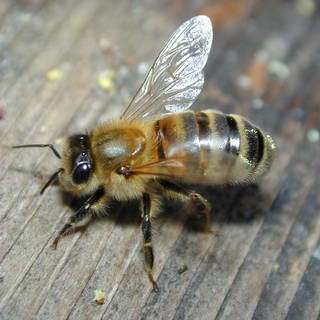Queen bee promiscuity boosts hive health

Though promiscuity may be risky behavior for humans, it's healthy for honeybees: Queen honeybees who indulge in sexual surfeits with multiple drones produce more disease-resistant colonies than monogamous monarchs.
According to a new Cornell study published in the Jan. 7 issue of the Proceedings of the Royal Society of London, the curious promiscuity of queen honeybees has long perplexed apiculturists, especially since seeking out multiple mates takes more time and energy and puts the queens at greater peril for predator attacks.
"Even though just one male provides all the sperm that a queen needs for the rest of her life, queen honeybees go out on mating flights and obtain sperm from a dozen or more males," said lead author Thomas Seeley, Cornell professor of biology and chair of the Department of Neurobiology and Behavior.
Seeley and David Tarpy of North Carolina State University tested the leading hypothesis that queens' promiscuity improves colony disease resistance by boosting the genetic diversity of their offspring, the worker bees. "This required a particularly nasty experiment, in which we inoculated colonies with the most virulent disease of honeybees that is known, the dreaded American foulbrood disease," said Seeley.
Specifically, Tarpy inseminated honeybee queens (Apis mellifera) with sperm from either a single drone or from 10 drones. Seeley then sprayed the brood colonies of the resulting 49 colonies (24 from "multiple-mate" queens and 25 from singly mated queens) with water tainted with spores of the highly virulent bacterium that infects bee larvae and causes the disease American Foulbrood.
Sure enough, the more genetically diverse colonies derived from multiple fathers were significantly less affected by the disease several months later.
The findings have implications for beekeepers, whose honeybees bring revenues of about $20 billion a year in the United States for pollinating services. Beekeepers could boost the health of their colonies, say the researchers, by promoting the queens' promiscuity by providing plentiful drones where queens are mating.
Source: Cornell University

















